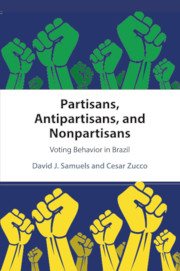Book contents
- Frontmatter
- Contents
- List of Figures
- List of Tables
- Acknowledgments
- 1 Introduction
- 2 Partisanship and Antipartisanship in Brazil
- 3 The Strength of Partisan Attitudes in Brazil
- 4 The Rise (and Decline) of Petismo
- 5 Partisanship, Antipartisanship, and Voting Behavior
- 6 Partisanship and Antipartisanship in Comparative Perspective
- 7 Conclusion: Parties, Voters, and Brazilian Democracy
- References
- Index
2 - Partisanship and Antipartisanship in Brazil
Published online by Cambridge University Press: 10 May 2018
- Frontmatter
- Contents
- List of Figures
- List of Tables
- Acknowledgments
- 1 Introduction
- 2 Partisanship and Antipartisanship in Brazil
- 3 The Strength of Partisan Attitudes in Brazil
- 4 The Rise (and Decline) of Petismo
- 5 Partisanship, Antipartisanship, and Voting Behavior
- 6 Partisanship and Antipartisanship in Comparative Perspective
- 7 Conclusion: Parties, Voters, and Brazilian Democracy
- References
- Index
Summary
Since the return of democracy in the 1980s, observers have lamented the extreme fragmentation of Brazil's party system and the weakness of parties in Brazilian voters’ minds. A new party emerged in the 1980s – the Partido dos Trabalhadores – and the number of petistas in the electorate quickly grew from 0% in 1980 to about 30% just one generation later. The PT also enjoyed increasing electoral success: between 1994 and 2014, candidates from the PT and its main rival, the PSDB, finished first or second in every presidential election, and the PT–PSDB rivalry imbued the chaotic party system with something of a bipartisan dynamic.
The PT scrapped for power with Brazil's other parties for more than thirty years. Yet competition among parties does not always reflect masslevel understandings of politics. As noted in Chapter 1, Brazil's political, cultural, and institutional context makes it an unlikely case to expect partisanship to impact voter attitudes and behavior. To what extent can the concept of party ID travel to “unlikely” cases like Brazil?
In this chapter, we first elaborate on the concepts of positive and negative partisanship and explore their spread among Brazilian voters since the 1980s. With evidence from national surveys going back to 1989, we confirm that to the extent that a party system in the electorate has existed in Brazil since redemocratization, it has largely revolved around attitudes about the PT. Not only do petistas and antipetistas comprise a large proportion of the electorate, but most positive partisans in Brazil are petistas and most negative partisans are antipetistas. This is not to say that partisanship for other parties does not matter at all – in fact, as we show in Chapter 3, particularly for those expressing an affinity for the PSDB, partisanship does appear to matter in the same way as petismo.However, despite the PSDB's prominent role in the party system since the late 1980s, no more than 5% of voters have ever declared themselves partisans of the PSDB. For the most part, support for the PSDB – or any other Brazilian party – has been based not on partisanship but on candidates’ personal qualities or their performance in office.
- Type
- Chapter
- Information
- Partisans, Antipartisans, and NonpartisansVoting Behavior in Brazil, pp. 19 - 55Publisher: Cambridge University PressPrint publication year: 2018



